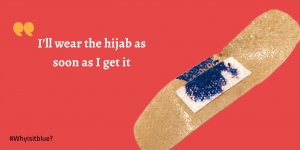Swimsuits
2012Ali: “Fuck that, how could my wife wear a swimsuit like this one?
And stand in front of men, while they look at her thighs?
Does it not bother you, Sherif, the idea of your wife wearing a swimsuit?”
Mine and Mine Alone
2019Ever since I was little,
I’ve always had “bad” hair.
It truly is bad hair.
It’s not curly.
It’s thin at the front,
And short and frizzy.
The Stage
2016My appearance is what’s stopping me from getting on stage.
I’ve even considered cosmetic surgery.
I’m learning script writing so that I could play my own self on stage.
I’ll write a play that talks about people like me.
I’ll find someone like me to play the leading role.
I Have a Problem with My Body
2016I have a problem with my body.
It suddenly got bigger and I felt the need to always hide it.
I had to hide my hair and my breasts.
And menstruation was the biggest secret of all.
Locked Up at Home
2010Ahmed: “What do you think of that hottie over there?”
Amr: “Which one? The veiled one?
I love veiled women.”
Ahmed: “Really?
Why?”
Amr: “You know when you get a wrapped present,
And you take your time unwrapping it?”
Ahmed: “I’m talking about the girl walking with her, man.
Of course I wasn’t talking about that woman over there.
She looks like the potential brides my mother makes me meet.”
Amr: “Your mother makes you meet potential brides?”
Ahmed: “Yeah, man.
All the time.
She thinks they’re all like her,
Or will be like her in exactly two years.
I’ve stopped meeting them,
So, now she sends me their pictures on Facebook.”
Reactions to My Veil
2009I hate people’s reactions at work when they meet me for the first time.
“You’re very brave to be veiled.”
“Veiled girls should get married and stay at home.”
And “Veiled girls aren’t competent workers.”
Wearing the Headscarf
2019I was always very independent,
Ever since I was young.
I never did anything unless I believed in it.
I decided to start wearing the headscarf.
I did so out of conviction.
No one interfered in my decision.
social stigma, hijab, discrimination
Why Did You Wear the Veil?
2010Good Lord, I haven't been asked that question in a while.
Maybe because people are entirely convinced that any woman who covers her head does so for one of the following reasons:
- Amr Khaled, the super famous Islamic preacher
- Her parents
- People on the street
- To get married


